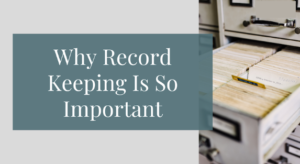Maintaining accurate and compliant records is not just a legal obligation for anyone operating a business—it’s also essential for understanding how your business is performing. Good record-keeping allows you to monitor progress, identify strengths and weaknesses, and make informed decisions. Given its importance, it’s crucial to give your financial records the attention they deserve.
With the rise of online accounting software and the convenience of bank feeds, many business owners assume that simply tracking income and expenses through their bank statements is sufficient. However, this approach is both non-compliant with Australian Taxation Office (ATO) requirements and inadequate for effective business management. Relying solely on bank transactions can lead to significant gaps in your records. Bank statements generally provide only minimal details—often lacking descriptions, invoice numbers, or context—which are vital for accurate reporting and audit readiness.
Moreover, bank feeds may not always capture the full picture. For example, the system might record a partial payment without linking it to the correct invoice or fail to reflect GST components. This can cause discrepancies in your financial data, leading to errors in your BAS (Business Activity Statement) or tax returns. In some cases, you may even miss out on legitimate deductions simply because the necessary supporting documentation wasn’t recorded properly.
To remain compliant and maintain control over your business finances, it’s essential to go beyond your bank feed. Keep thorough, well-organized records of all income, expenses, invoices, and receipts. Use your accounting software not just as a transaction tracker, but as a comprehensive financial management tool. By doing so, you’ll be in a much stronger position to meet ATO requirements, understand your financial health, and make confident, strategic decisions that support your business growth.
Here are five key advantages of maintaining good record-keeping practices in your business.
1. Get the maximum return from your business
If you’re aiming to get the maximum return from your business, paying attention to the details—specifically, your data—is essential. And the foundation of having accurate, insightful data is effective record-keeping. Without it, you’re essentially operating in the dark, making decisions based on assumptions rather than facts.
Consider the world of sports. The most successful teams aren’t just relying on talent or intuition—they’re driven by data. Coaches and managers analyze every aspect of their players’ performance. They can identify who performs best in specific positions, what strategies yield the highest success rates, and even pinpoint the time of day an individual or team tends to perform at their peak. This level of insight isn’t possible without meticulous data collection and analysis.
The same principle applies to your business. With well-maintained records, you gain clarity on what’s working and what’s not. You can track sales trends, monitor expenses, measure profitability, and identify areas for improvement. Record-keeping enables you to run reports, analyze performance over time, and make informed decisions that drive growth.
Moreover, detailed records help you set realistic goals, manage cash flow, and spot opportunities or risks early. They also make your business more attractive to investors, lenders, or potential buyers, as strong records demonstrate professionalism and transparency.
In short, good record-keeping isn’t just about compliance—it’s a strategic tool. Just like a winning sports team, your business needs data to stay competitive, efficient, and profitable. The better your records, the better your results.
2. Know which products sell best
Knowing which products are your top performers, identifying the time of day when sales peak, understanding who your most valuable clients are, and recognizing your best-selling items—these are just a few of the powerful insights that good record-keeping can provide. While they may seem like simple pieces of information, they hold immense value when it comes to making smart, strategic business decisions.
Accurate records help you analyze customer behavior, track product performance, and uncover trends that might otherwise go unnoticed. With this data, you can tailor your marketing strategies, manage inventory more efficiently, and focus your efforts on the areas that yield the highest returns. For example, if your records show that a certain product sells better in the afternoon, you might time promotions or stock levels accordingly. Or if certain clients make repeat purchases, you can prioritize nurturing those relationships.
Beyond improving day-to-day operations, good records also support long-term planning and growth. They help you spot opportunities, avoid costly mistakes, and remain agile in a competitive market. In short, solid record-keeping gives you the visibility and control you need to run your business smarter, not harder. It’s the foundation of informed decision-making and sustainable success.
3. Compare and identify trends
By maintaining consistent records over time, you’ll gain the ability to compare data and identify meaningful trends. These trends can reveal patterns in your business performance, helping you pinpoint areas that require attention or improvement. Whether it’s noticing a seasonal dip in sales or a rise in a particular product’s popularity, these insights allow you to make more strategic and informed decisions.
To begin, it’s important to determine which details you want to focus on. You don’t need to track everything at once—in fact, it’s better to start small. Choose a few key metrics or reports that are most relevant to your current business goals. This might include sales by product, peak selling hours, or client purchase frequency.
As you become more comfortable with your data and start recognizing what truly matters to your operations, you can gradually expand your tracking efforts. Over time, this process will naturally evolve into a more comprehensive reporting system or dashboard that provides a clearer view of your overall business health.
The goal is to build a solid foundation with simple reports, then refine and expand them as your understanding grows. This step-by-step approach ensures your record-keeping becomes a powerful tool for business growth and decision-making.
4. Revolve disputes quickly
A strong record-keeping system offers more than just financial insights—it also helps protect and streamline your business operations. One of the key advantages is the ability to resolve disputes quickly. Whether it’s a disagreement with a customer, supplier, or employee, having clear and accurate records allows you to present facts, not opinions. This can save time, money, and relationships.
Good records also help in detecting and preventing fraud or theft. By regularly reviewing your financial data, you’re more likely to notice unusual patterns or discrepancies early on. This allows you to take swift action before minor issues become major problems.
Additionally, keeping detailed records makes it easier to monitor supplier performance. You can track delivery times, pricing changes, or service quality, and make informed decisions about whether to continue doing business with them. It also helps avoid costly oversights—like double payments, missed invoices, or inaccurate charges—because everything is documented and accessible.
When your business is backed by a reliable and consistent record-keeping system, you’re better prepared to identify red flags, take corrective action, and maintain operational control. In short, it acts as a safeguard, ensuring your business stays efficient, transparent, and on the right path to success.
5. Better Financial Planning and Growth
Keeping your business records up to date goes far beyond just staying organized—it plays a key role in financial planning and long-term success. When your records are current and accurate, you’re better equipped to create reliable forecasts, set realistic budgets, and plan for future growth. You’ll have a clear understanding of your cash flow, expenses, and revenue trends, allowing you to make informed decisions with confidence.
Up-to-date records also help you identify potential challenges before they become major issues. Whether it’s noticing a dip in sales, an increase in operating costs, or an upcoming tax obligation, timely data allows you to respond proactively rather than reactively. This level of control is essential for maintaining business stability and seizing new opportunities as they arise.
Moreover, well-maintained records demonstrate professionalism and accountability. Investors, lenders, and other stakeholders are more likely to trust and support your business when they see that your financial information is organized, transparent, and accurate. Whether you’re applying for a loan, seeking new investment, or preparing for an audit, detailed records build credibility and confidence.
In essence, good record-keeping is not just a back-office task—it’s a strategic asset that supports financial health, operational efficiency, and business growth.






